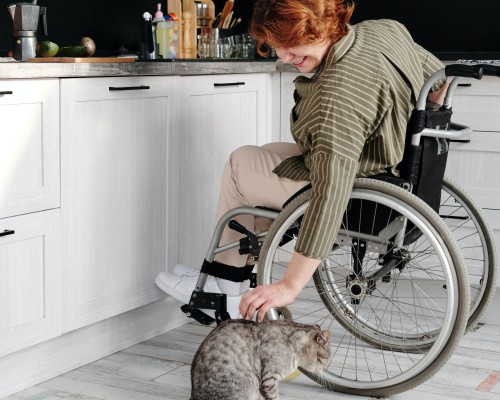Tips on How to Help Your State of Mind After Spinal Cord Injury (Mental Health Series Part One)

Regardless of whether you have recently sustained a spinal cord injury (SCI) or have had your SCI for many years, you might be experiencing changes in your mental health. Sadly, research suggests that the risk and rate of mental health diseases are higher in those who have an SCI.
When someone has recently sustained an SCI, they often experience many new emotions due to this dramatic change in their life.
You may be at an increased risk of developing mental health issues for many different reasons related to your SCI. A few reasons may include:
- Grieving the loss of who you were before your SCI.
- Difficulties with accepting that you may no longer be able to do things you are passionate about in the same way.
- Stress from trying to figure out what career you now want if you can no longer be in yours or be in the one you wanted.
- Experiencing autonomic nervous system reactions due to the trauma you experienced.
- For example, I experienced a heightened sensitivity to sound after my injury and an exaggerated startle response to sudden noises or movements. This response has dramatically decreased, but still affects me to this day.
In comparison, if you have had your SCI for a while, you may still have a higher risk of developing mental health issues for many different reasons related to your injury. A few of these possible reasons include:
- Experiencing issues with employment due to systemic inequities.
- Experiencing financial problems and poverty due to systemic inequities, lack of financial support, or the cost of living with an SCI such as medications, wheelchairs, catheters, and many more.
- Experiencing a lack of social support or social connection in the form of friends and family due to ableism, medical issues keeping you at home or in hospital, or due to fears of trying to make friends.
- Living in a space that is not very accessible for you.
- Experiencing medical issues like pressure sores.
- Having a difficult time with getting good caregivers.
- Having unresolved past trauma (unrelated to your SCI) that has not been healed.
- Many of us experience trauma before and after our SCI that has nothing to do with our injury. When we do not work through this trauma, the SCI often pushes us over the edge. So, we may begin to believe that life with an SCI is way more challenging compared to life without an SCI. However, in reality, life is often equally or more challenging when we have trauma of any kind that we have not acknowledged and healed from.
As a result of the increased risk of mental health issues within my SCI community, I believe it is crucial to share the different ways I help my mental health. I hope my knowledge can help my community. Therefore, this blog series discusses several ways to help your state of mind and explain why these practices work. I encourage you to come back often and look for blogs on the following subjects:
- Pet therapy
- Mindfulness meditation
- Grounding techniques
- Spending time outside in nature
- Massage therapy
- Stop comparing yourself to others
- Stay active
- Allow yourself to be vulnerable
- Avoid isolating yourself and build a community of friends with SCIs
- Treatment: therapy and medications
- Aromatherapy
- Keep a regular skincare routine
Let us dive into the first topic!
Pet Therapy
Research demonstrates that pet and animal therapy have positive effects on the individual interacting with the animal, whether in-person or through technology (video chat or videos of animals online).
When interacting with a pet, your body releases endorphins, which are brain chemicals that make you feel good. Endorphins have the same effects as drugs that activate opioid receptors (e.g., morphine and Vicodin) without the harmful and addictive effects. Additionally, research shows that pet therapy decreases the levels of stress hormones (e.g., cortisol and epinephrine) your body releases. Therefore, pet therapy often decreases stress and anxiety while improving mood and focus.
I experienced the benefits of animal therapy when volunteer animals came to the hospital during my rehabilitation journey, as well as when friends brought their pets to see me when I lived in long-term care (LTC), and now, with my dog.
Let me tell you; science does not lie here. When I have a tough time mentally, I always make time to train and cuddle with my big fella, Toby, and my mood instantly changes. Although he does not know, Toby is my own personal at-home therapist, and I cannot thank him enough for saving my sanity daily. A bond between a human and an animal is the greatest gift anyone may experience. Animals do not judge you and they love you unconditionally, which is important for people with SCIs due to the way these injuries often impact our social relationships and how many people we may see.
Conclusion
In this blog, I have introduced and described the goal of this series. I hope you find these tips and techniques helpful in improving your state of mind after experiencing an SCI.
I welcome you to check out the rest of this blog series! Stay tuned!
